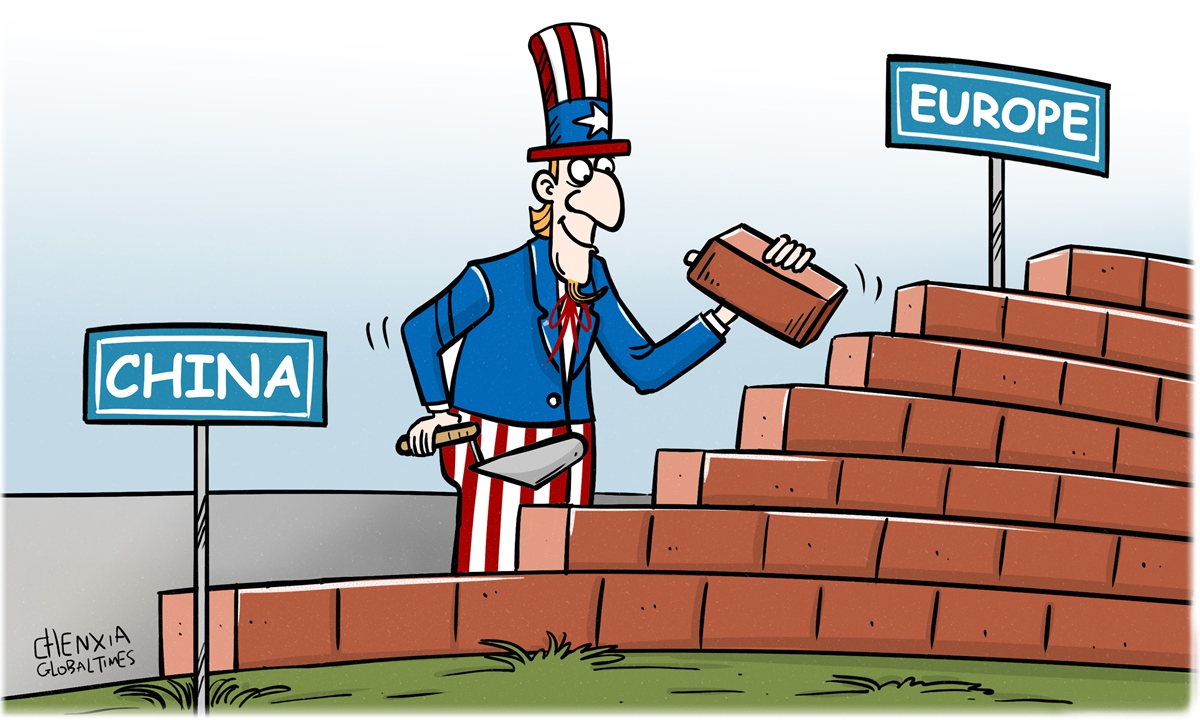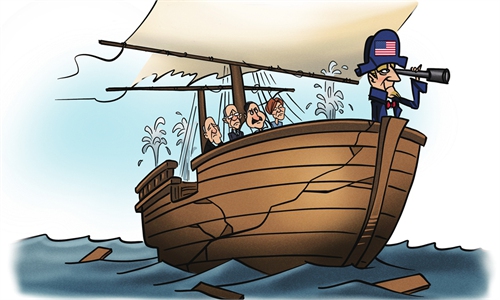
Illustration: Chen Xia/GT
Foreign Policy magazine recently published an article titled "Olaf Scholz Is Undermining Western Unity on China." The article claimed that Scholz's Germany-first approach has confused his coalition government's development of China policy and alienated partners in Europe and beyond. It went on saying that democratic powers need to align their rhetoric and policies on China to come to the table from a position of strength.This article is repeating the cliché with a self-superiority and hegemonic-centric mindset that emphasizes that Western allies should be condemned if they are not consistently tied to the US chariot and be put in a position that has been criticized if what they are doing is not in line with the US' needs.
Germany wants to show that it has a certain degree of autonomy in its policy toward China, while obviously this article is against that. The authors, both of whom serve for the Australian Strategic Policy Institute (ASPI), a Canberra-based organization which takes an anti-China line, seem to indicate that only Washington has the final say, while other countries cannot directly deal with China themselves. Such hegemonic logic that does not tolerate the independence of allies implies that the US cannot lose any leverage to suppress China, and European countries cannot rely on anyone else except Washington.
From Germany's perspective, all countries have their own national interests. No country in the world, including the US, has the right to use its own interests to define the interests of other countries. The article is obviously intended to belittle Germany, a major player in the international community, as a follower and vassal of the US.
In addition, from the perspective of China, it has a vast market and a diverse policy in terms of economy, security, and diplomacy. This means that China will be a friend and partner of most countries in the world. However, facing a country that has made great contributions and is very friendly to other countries, the authors blatantly slander it, which shows their deep-rooted prejudice against China. This also reflects the irrational attitude of the forces behind them which is destructive in the international community.
China has never been an enemy of the West. Although some Western countries may show a tendency toward trade protectionism, they do not pursue hegemonic ideologies like the US, so there will be no fundamental conflicts in their relations with China. However, this Foreign Policy article gave people an illusion that the West is a single whole and China is on the opposite side, Lü Xiang, a research fellow at the Chinese Academy of Social Sciences, told the Global Times.
The authors are old hands in the wordplay of smearing China. They did not forget to emphasize that "diplomatic engagement with China is critical, particularly as Western governments navigate increasingly strained relations with the country. The question is how to do it." A Beijing-based expert on international relations noted that the engagement the authors said is not an attempt to reach a pattern of equality and reciprocity with China but rather a way to show allies that the US is not so vicious. The purpose is to use engagement as a guise to better push allies to take sides and engage in strategic competition with China.
Scholz's visit to China has produced an effect in Western countries, which will encourage more US allies to make independent judgments based on their own interests rather than according to Washington's position and standards. As an increasing number of European countries and even some allies of the US in Asia have closer economic ties and cultural exchanges with China, they will definitely feel disgusted and repelled by the US pulling more countries into the camp against China, said the Beijing-based expert.
No matter how certain forces criticize Berlin, it is hard to stop more and more countries from cooperating with China. This not only shows that the supposed anti-China unity formed by the US is incredibly fragile, but also reflects the anxiety of the US.
The US has encountered setbacks in drawing in allies against China. This is why forces such as the ASPI have once again come forward to promote hostile sentiments toward China. However, the logic of hegemony is not marketable in the international community. By contrast, China, which adheres to the principles of mutual respect, peaceful coexistence, and win-win cooperation, will win more respect and cooperation.
The author is a reporter with the Global Times. opinion@globaltimes.com.cn

